Analyzing Blacklisting, GDPR Compliance, and Employment Relations
VerifiedAdded on 2023/06/17
|9
|2355
|314
Report
AI Summary
This report examines the legality of blacklisting employees, justifying its illegality through employment relations theories, particularly unitarism. It advises on modifying data management practices based on the General Data Protection Regulation (GDPR) to ensure data protection and security. The report further discusses the potential costs firms may incur by mismanaging employee data under GDPR rules, including substantial fines and reputational damage. It emphasizes the importance of maintaining positive employee relations and ethical behavior to avoid blacklisting, suggesting alternative strategies such as improved communication, training, and fair recruitment processes. The conclusion highlights the crucial role of GDPR in protecting private data and condemns blacklisting as an unethical practice.
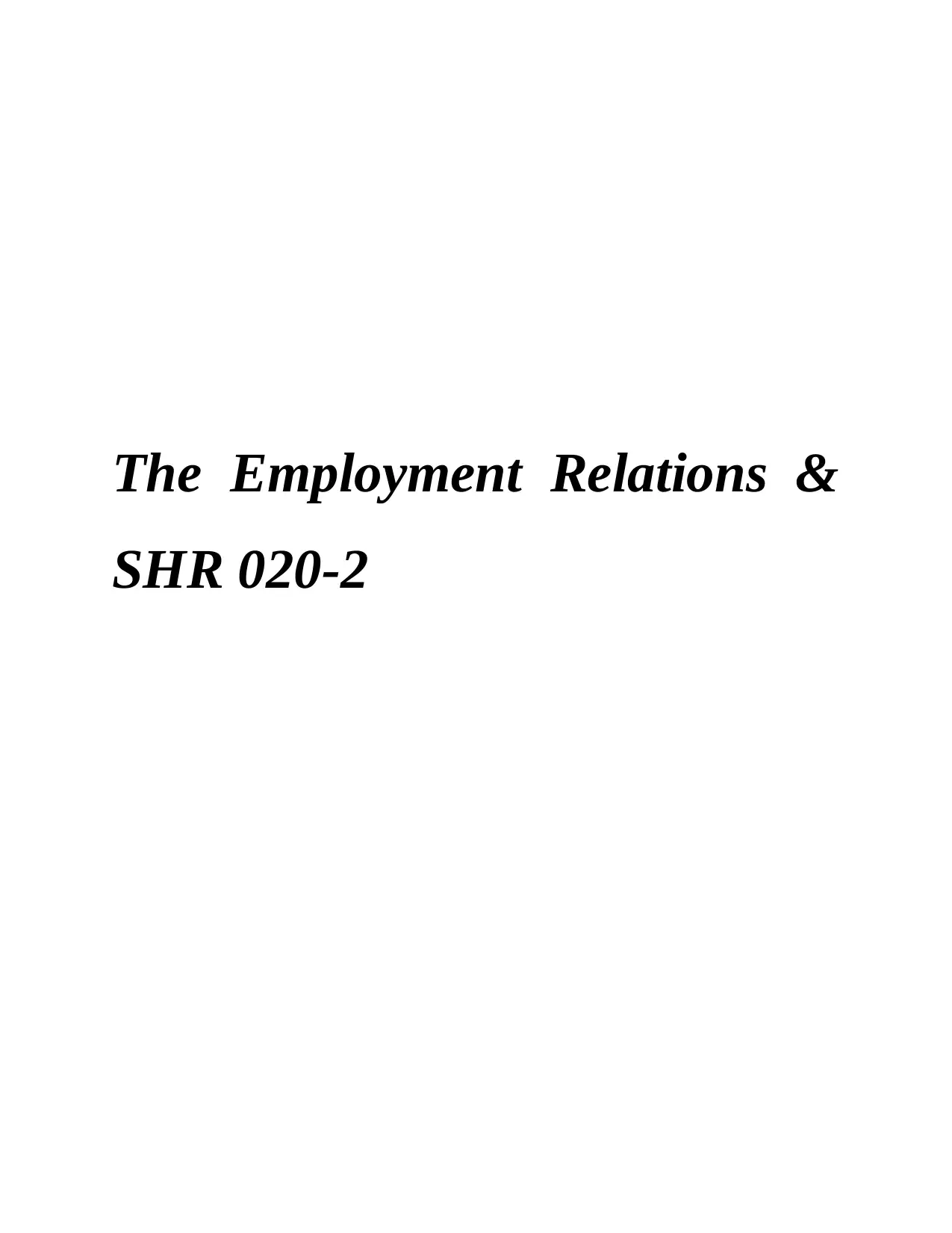
The Employment Relations &
SHR 020-2
SHR 020-2
Paraphrase This Document
Need a fresh take? Get an instant paraphrase of this document with our AI Paraphraser
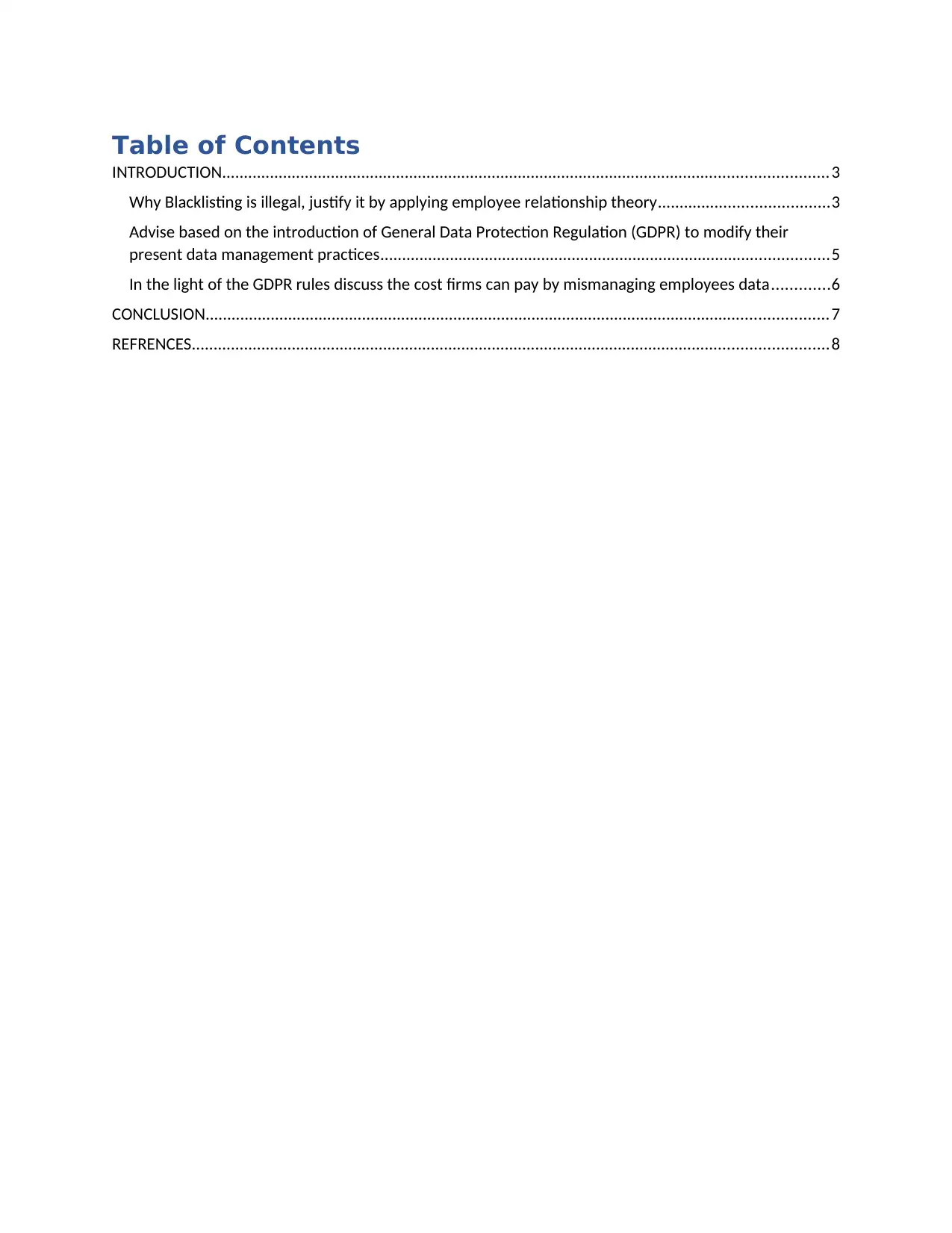
Table of Contents
INTRODUCTION...........................................................................................................................................3
Why Blacklisting is illegal, justify it by applying employee relationship theory.......................................3
Advise based on the introduction of General Data Protection Regulation (GDPR) to modify their
present data management practices.......................................................................................................5
In the light of the GDPR rules discuss the cost firms can pay by mismanaging employees data.............6
CONCLUSION...............................................................................................................................................7
REFRENCES..................................................................................................................................................8
INTRODUCTION...........................................................................................................................................3
Why Blacklisting is illegal, justify it by applying employee relationship theory.......................................3
Advise based on the introduction of General Data Protection Regulation (GDPR) to modify their
present data management practices.......................................................................................................5
In the light of the GDPR rules discuss the cost firms can pay by mismanaging employees data.............6
CONCLUSION...............................................................................................................................................7
REFRENCES..................................................................................................................................................8
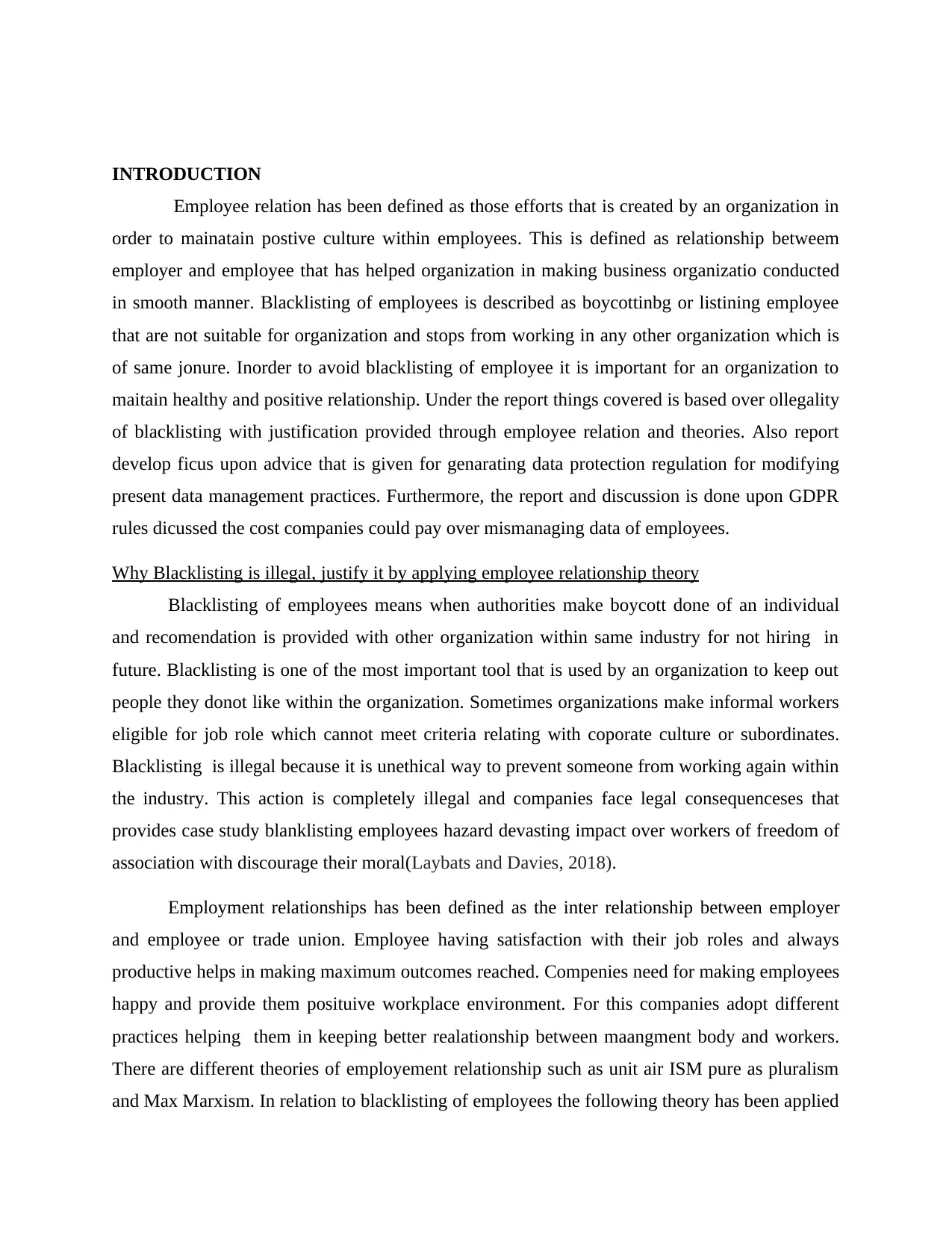
INTRODUCTION
Employee relation has been defined as those efforts that is created by an organization in
order to mainatain postive culture within employees. This is defined as relationship betweem
employer and employee that has helped organization in making business organizatio conducted
in smooth manner. Blacklisting of employees is described as boycottinbg or listining employee
that are not suitable for organization and stops from working in any other organization which is
of same jonure. Inorder to avoid blacklisting of employee it is important for an organization to
maitain healthy and positive relationship. Under the report things covered is based over ollegality
of blacklisting with justification provided through employee relation and theories. Also report
develop ficus upon advice that is given for genarating data protection regulation for modifying
present data management practices. Furthermore, the report and discussion is done upon GDPR
rules dicussed the cost companies could pay over mismanaging data of employees.
Why Blacklisting is illegal, justify it by applying employee relationship theory
Blacklisting of employees means when authorities make boycott done of an individual
and recomendation is provided with other organization within same industry for not hiring in
future. Blacklisting is one of the most important tool that is used by an organization to keep out
people they donot like within the organization. Sometimes organizations make informal workers
eligible for job role which cannot meet criteria relating with coporate culture or subordinates.
Blacklisting is illegal because it is unethical way to prevent someone from working again within
the industry. This action is completely illegal and companies face legal consequenceses that
provides case study blanklisting employees hazard devasting impact over workers of freedom of
association with discourage their moral(Laybats and Davies, 2018).
Employment relationships has been defined as the inter relationship between employer
and employee or trade union. Employee having satisfaction with their job roles and always
productive helps in making maximum outcomes reached. Compenies need for making employees
happy and provide them posituive workplace environment. For this companies adopt different
practices helping them in keeping better realationship between maangment body and workers.
There are different theories of employement relationship such as unit air ISM pure as pluralism
and Max Marxism. In relation to blacklisting of employees the following theory has been applied
Employee relation has been defined as those efforts that is created by an organization in
order to mainatain postive culture within employees. This is defined as relationship betweem
employer and employee that has helped organization in making business organizatio conducted
in smooth manner. Blacklisting of employees is described as boycottinbg or listining employee
that are not suitable for organization and stops from working in any other organization which is
of same jonure. Inorder to avoid blacklisting of employee it is important for an organization to
maitain healthy and positive relationship. Under the report things covered is based over ollegality
of blacklisting with justification provided through employee relation and theories. Also report
develop ficus upon advice that is given for genarating data protection regulation for modifying
present data management practices. Furthermore, the report and discussion is done upon GDPR
rules dicussed the cost companies could pay over mismanaging data of employees.
Why Blacklisting is illegal, justify it by applying employee relationship theory
Blacklisting of employees means when authorities make boycott done of an individual
and recomendation is provided with other organization within same industry for not hiring in
future. Blacklisting is one of the most important tool that is used by an organization to keep out
people they donot like within the organization. Sometimes organizations make informal workers
eligible for job role which cannot meet criteria relating with coporate culture or subordinates.
Blacklisting is illegal because it is unethical way to prevent someone from working again within
the industry. This action is completely illegal and companies face legal consequenceses that
provides case study blanklisting employees hazard devasting impact over workers of freedom of
association with discourage their moral(Laybats and Davies, 2018).
Employment relationships has been defined as the inter relationship between employer
and employee or trade union. Employee having satisfaction with their job roles and always
productive helps in making maximum outcomes reached. Compenies need for making employees
happy and provide them posituive workplace environment. For this companies adopt different
practices helping them in keeping better realationship between maangment body and workers.
There are different theories of employement relationship such as unit air ISM pure as pluralism
and Max Marxism. In relation to blacklisting of employees the following theory has been applied
⊘ This is a preview!⊘
Do you want full access?
Subscribe today to unlock all pages.

Trusted by 1+ million students worldwide
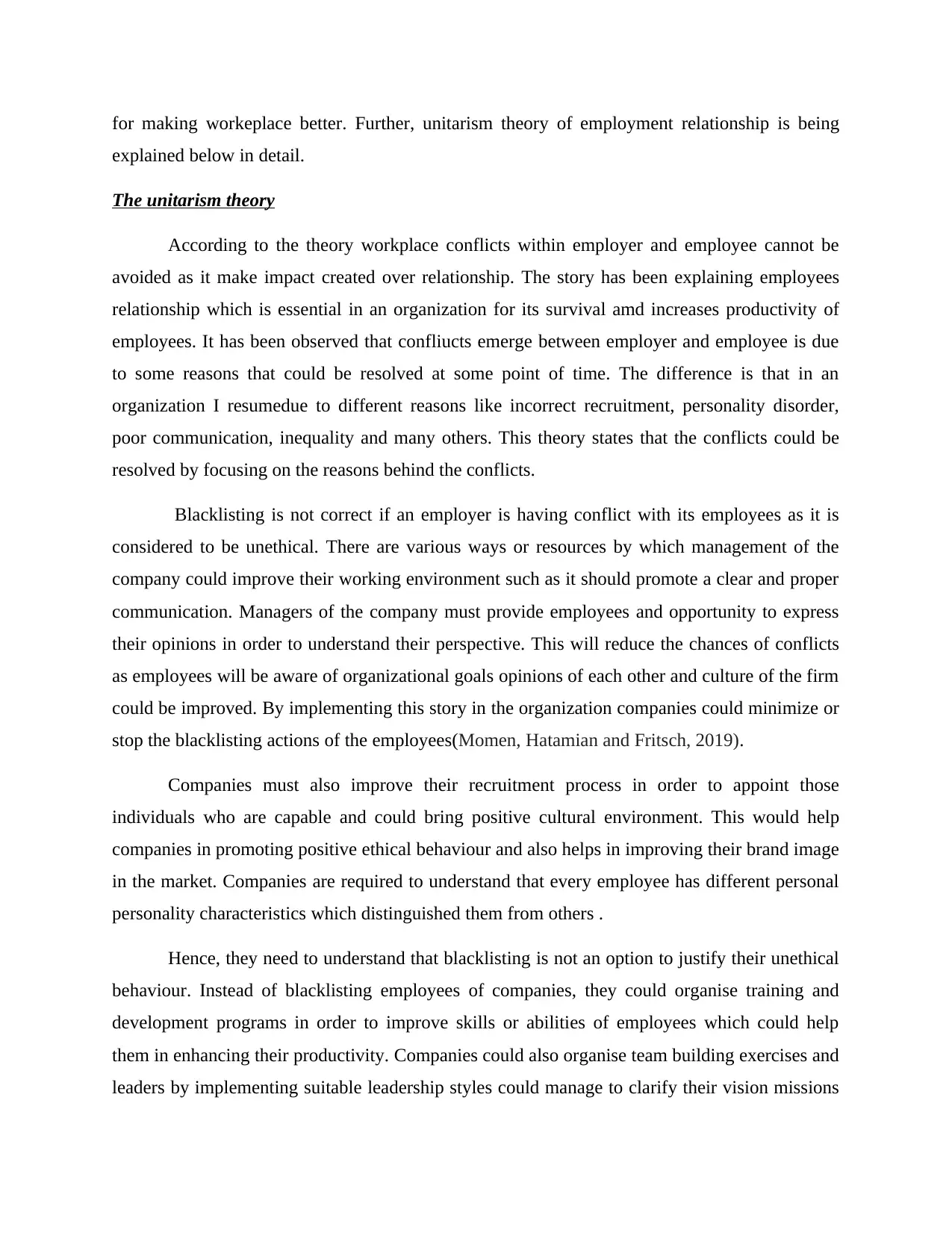
for making workeplace better. Further, unitarism theory of employment relationship is being
explained below in detail.
The unitarism theory
According to the theory workplace conflicts within employer and employee cannot be
avoided as it make impact created over relationship. The story has been explaining employees
relationship which is essential in an organization for its survival amd increases productivity of
employees. It has been observed that confliucts emerge between employer and employee is due
to some reasons that could be resolved at some point of time. The difference is that in an
organization I resumedue to different reasons like incorrect recruitment, personality disorder,
poor communication, inequality and many others. This theory states that the conflicts could be
resolved by focusing on the reasons behind the conflicts.
Blacklisting is not correct if an employer is having conflict with its employees as it is
considered to be unethical. There are various ways or resources by which management of the
company could improve their working environment such as it should promote a clear and proper
communication. Managers of the company must provide employees and opportunity to express
their opinions in order to understand their perspective. This will reduce the chances of conflicts
as employees will be aware of organizational goals opinions of each other and culture of the firm
could be improved. By implementing this story in the organization companies could minimize or
stop the blacklisting actions of the employees(Momen, Hatamian and Fritsch, 2019).
Companies must also improve their recruitment process in order to appoint those
individuals who are capable and could bring positive cultural environment. This would help
companies in promoting positive ethical behaviour and also helps in improving their brand image
in the market. Companies are required to understand that every employee has different personal
personality characteristics which distinguished them from others .
Hence, they need to understand that blacklisting is not an option to justify their unethical
behaviour. Instead of blacklisting employees of companies, they could organise training and
development programs in order to improve skills or abilities of employees which could help
them in enhancing their productivity. Companies could also organise team building exercises and
leaders by implementing suitable leadership styles could manage to clarify their vision missions
explained below in detail.
The unitarism theory
According to the theory workplace conflicts within employer and employee cannot be
avoided as it make impact created over relationship. The story has been explaining employees
relationship which is essential in an organization for its survival amd increases productivity of
employees. It has been observed that confliucts emerge between employer and employee is due
to some reasons that could be resolved at some point of time. The difference is that in an
organization I resumedue to different reasons like incorrect recruitment, personality disorder,
poor communication, inequality and many others. This theory states that the conflicts could be
resolved by focusing on the reasons behind the conflicts.
Blacklisting is not correct if an employer is having conflict with its employees as it is
considered to be unethical. There are various ways or resources by which management of the
company could improve their working environment such as it should promote a clear and proper
communication. Managers of the company must provide employees and opportunity to express
their opinions in order to understand their perspective. This will reduce the chances of conflicts
as employees will be aware of organizational goals opinions of each other and culture of the firm
could be improved. By implementing this story in the organization companies could minimize or
stop the blacklisting actions of the employees(Momen, Hatamian and Fritsch, 2019).
Companies must also improve their recruitment process in order to appoint those
individuals who are capable and could bring positive cultural environment. This would help
companies in promoting positive ethical behaviour and also helps in improving their brand image
in the market. Companies are required to understand that every employee has different personal
personality characteristics which distinguished them from others .
Hence, they need to understand that blacklisting is not an option to justify their unethical
behaviour. Instead of blacklisting employees of companies, they could organise training and
development programs in order to improve skills or abilities of employees which could help
them in enhancing their productivity. Companies could also organise team building exercises and
leaders by implementing suitable leadership styles could manage to clarify their vision missions
Paraphrase This Document
Need a fresh take? Get an instant paraphrase of this document with our AI Paraphraser
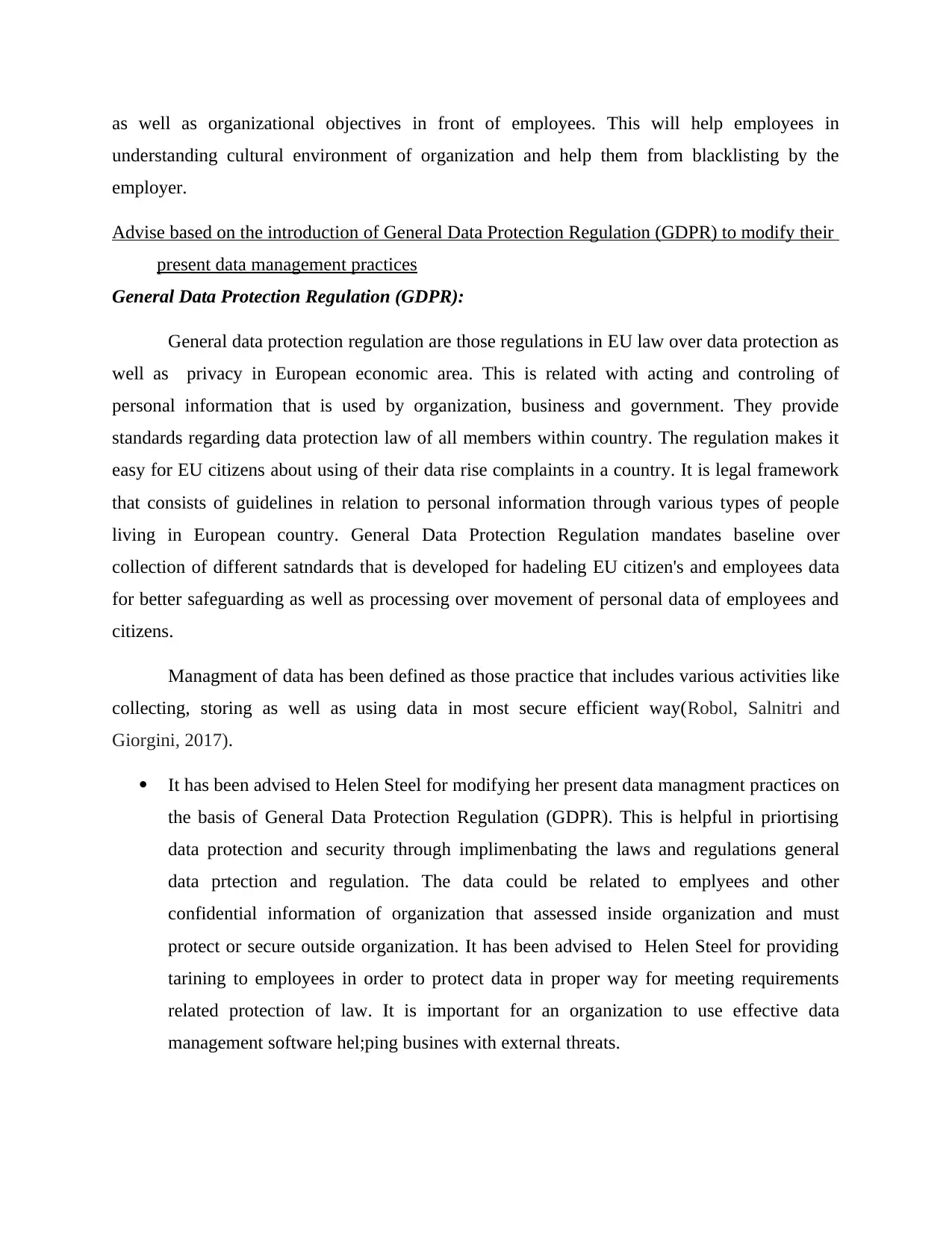
as well as organizational objectives in front of employees. This will help employees in
understanding cultural environment of organization and help them from blacklisting by the
employer.
Advise based on the introduction of General Data Protection Regulation (GDPR) to modify their
present data management practices
General Data Protection Regulation (GDPR):
General data protection regulation are those regulations in EU law over data protection as
well as privacy in European economic area. This is related with acting and controling of
personal information that is used by organization, business and government. They provide
standards regarding data protection law of all members within country. The regulation makes it
easy for EU citizens about using of their data rise complaints in a country. It is legal framework
that consists of guidelines in relation to personal information through various types of people
living in European country. General Data Protection Regulation mandates baseline over
collection of different satndards that is developed for hadeling EU citizen's and employees data
for better safeguarding as well as processing over movement of personal data of employees and
citizens.
Managment of data has been defined as those practice that includes various activities like
collecting, storing as well as using data in most secure efficient way(Robol, Salnitri and
Giorgini, 2017).
It has been advised to Helen Steel for modifying her present data managment practices on
the basis of General Data Protection Regulation (GDPR). This is helpful in priortising
data protection and security through implimenbating the laws and regulations general
data prtection and regulation. The data could be related to emplyees and other
confidential information of organization that assessed inside organization and must
protect or secure outside organization. It has been advised to Helen Steel for providing
tarining to employees in order to protect data in proper way for meeting requirements
related protection of law. It is important for an organization to use effective data
management software hel;ping busines with external threats.
understanding cultural environment of organization and help them from blacklisting by the
employer.
Advise based on the introduction of General Data Protection Regulation (GDPR) to modify their
present data management practices
General Data Protection Regulation (GDPR):
General data protection regulation are those regulations in EU law over data protection as
well as privacy in European economic area. This is related with acting and controling of
personal information that is used by organization, business and government. They provide
standards regarding data protection law of all members within country. The regulation makes it
easy for EU citizens about using of their data rise complaints in a country. It is legal framework
that consists of guidelines in relation to personal information through various types of people
living in European country. General Data Protection Regulation mandates baseline over
collection of different satndards that is developed for hadeling EU citizen's and employees data
for better safeguarding as well as processing over movement of personal data of employees and
citizens.
Managment of data has been defined as those practice that includes various activities like
collecting, storing as well as using data in most secure efficient way(Robol, Salnitri and
Giorgini, 2017).
It has been advised to Helen Steel for modifying her present data managment practices on
the basis of General Data Protection Regulation (GDPR). This is helpful in priortising
data protection and security through implimenbating the laws and regulations general
data prtection and regulation. The data could be related to emplyees and other
confidential information of organization that assessed inside organization and must
protect or secure outside organization. It has been advised to Helen Steel for providing
tarining to employees in order to protect data in proper way for meeting requirements
related protection of law. It is important for an organization to use effective data
management software hel;ping busines with external threats.
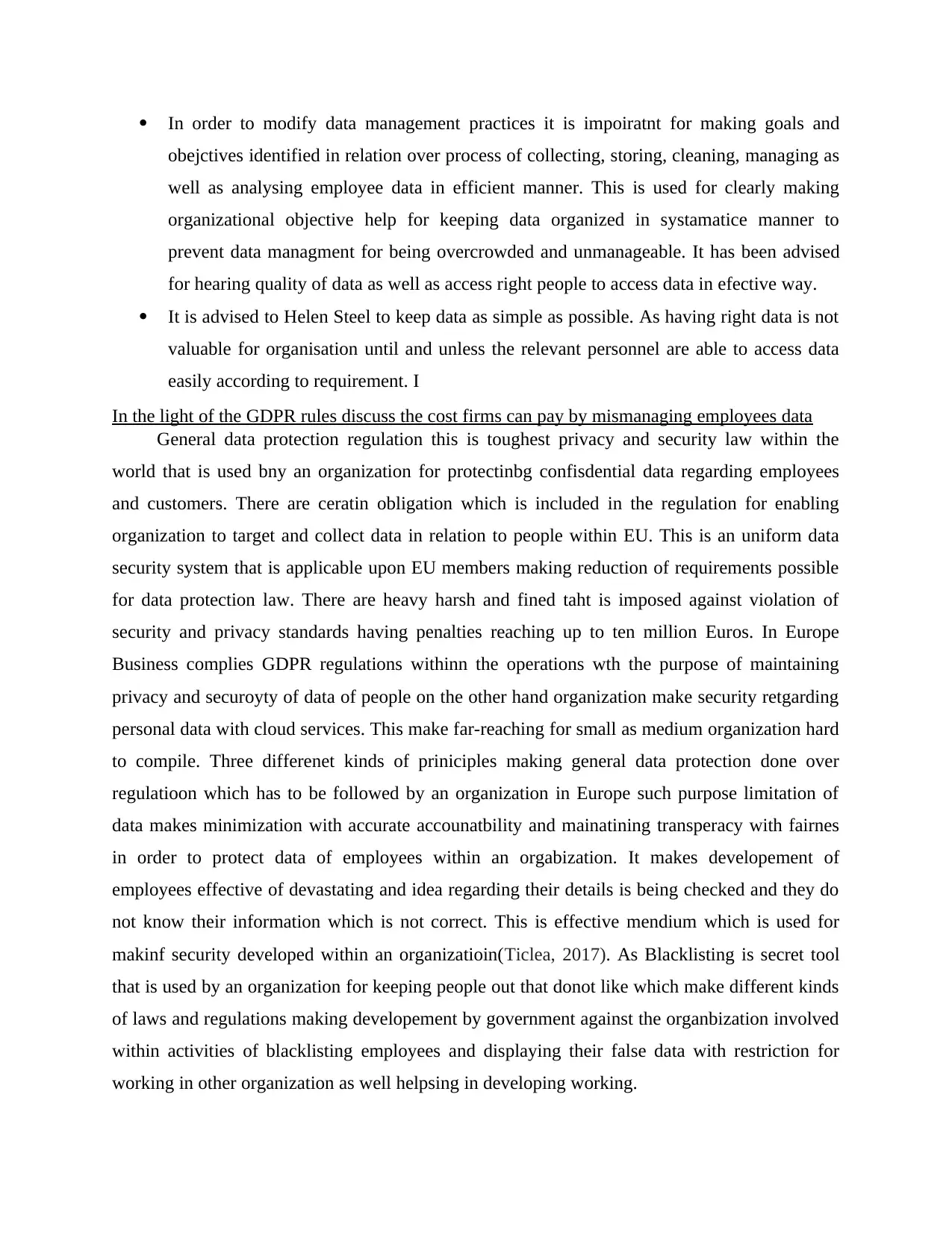
In order to modify data management practices it is impoiratnt for making goals and
obejctives identified in relation over process of collecting, storing, cleaning, managing as
well as analysing employee data in efficient manner. This is used for clearly making
organizational objective help for keeping data organized in systamatice manner to
prevent data managment for being overcrowded and unmanageable. It has been advised
for hearing quality of data as well as access right people to access data in efective way.
It is advised to Helen Steel to keep data as simple as possible. As having right data is not
valuable for organisation until and unless the relevant personnel are able to access data
easily according to requirement. I
In the light of the GDPR rules discuss the cost firms can pay by mismanaging employees data
General data protection regulation this is toughest privacy and security law within the
world that is used bny an organization for protectinbg confisdential data regarding employees
and customers. There are ceratin obligation which is included in the regulation for enabling
organization to target and collect data in relation to people within EU. This is an uniform data
security system that is applicable upon EU members making reduction of requirements possible
for data protection law. There are heavy harsh and fined taht is imposed against violation of
security and privacy standards having penalties reaching up to ten million Euros. In Europe
Business complies GDPR regulations withinn the operations wth the purpose of maintaining
privacy and securoyty of data of people on the other hand organization make security retgarding
personal data with cloud services. This make far-reaching for small as medium organization hard
to compile. Three differenet kinds of priniciples making general data protection done over
regulatioon which has to be followed by an organization in Europe such purpose limitation of
data makes minimization with accurate accounatbility and mainatining transperacy with fairnes
in order to protect data of employees within an orgabization. It makes developement of
employees effective of devastating and idea regarding their details is being checked and they do
not know their information which is not correct. This is effective mendium which is used for
makinf security developed within an organizatioin(Ticlea, 2017). As Blacklisting is secret tool
that is used by an organization for keeping people out that donot like which make different kinds
of laws and regulations making developement by government against the organbization involved
within activities of blacklisting employees and displaying their false data with restriction for
working in other organization as well helpsing in developing working.
obejctives identified in relation over process of collecting, storing, cleaning, managing as
well as analysing employee data in efficient manner. This is used for clearly making
organizational objective help for keeping data organized in systamatice manner to
prevent data managment for being overcrowded and unmanageable. It has been advised
for hearing quality of data as well as access right people to access data in efective way.
It is advised to Helen Steel to keep data as simple as possible. As having right data is not
valuable for organisation until and unless the relevant personnel are able to access data
easily according to requirement. I
In the light of the GDPR rules discuss the cost firms can pay by mismanaging employees data
General data protection regulation this is toughest privacy and security law within the
world that is used bny an organization for protectinbg confisdential data regarding employees
and customers. There are ceratin obligation which is included in the regulation for enabling
organization to target and collect data in relation to people within EU. This is an uniform data
security system that is applicable upon EU members making reduction of requirements possible
for data protection law. There are heavy harsh and fined taht is imposed against violation of
security and privacy standards having penalties reaching up to ten million Euros. In Europe
Business complies GDPR regulations withinn the operations wth the purpose of maintaining
privacy and securoyty of data of people on the other hand organization make security retgarding
personal data with cloud services. This make far-reaching for small as medium organization hard
to compile. Three differenet kinds of priniciples making general data protection done over
regulatioon which has to be followed by an organization in Europe such purpose limitation of
data makes minimization with accurate accounatbility and mainatining transperacy with fairnes
in order to protect data of employees within an orgabization. It makes developement of
employees effective of devastating and idea regarding their details is being checked and they do
not know their information which is not correct. This is effective mendium which is used for
makinf security developed within an organizatioin(Ticlea, 2017). As Blacklisting is secret tool
that is used by an organization for keeping people out that donot like which make different kinds
of laws and regulations making developement by government against the organbization involved
within activities of blacklisting employees and displaying their false data with restriction for
working in other organization as well helpsing in developing working.
⊘ This is a preview!⊘
Do you want full access?
Subscribe today to unlock all pages.

Trusted by 1+ million students worldwide
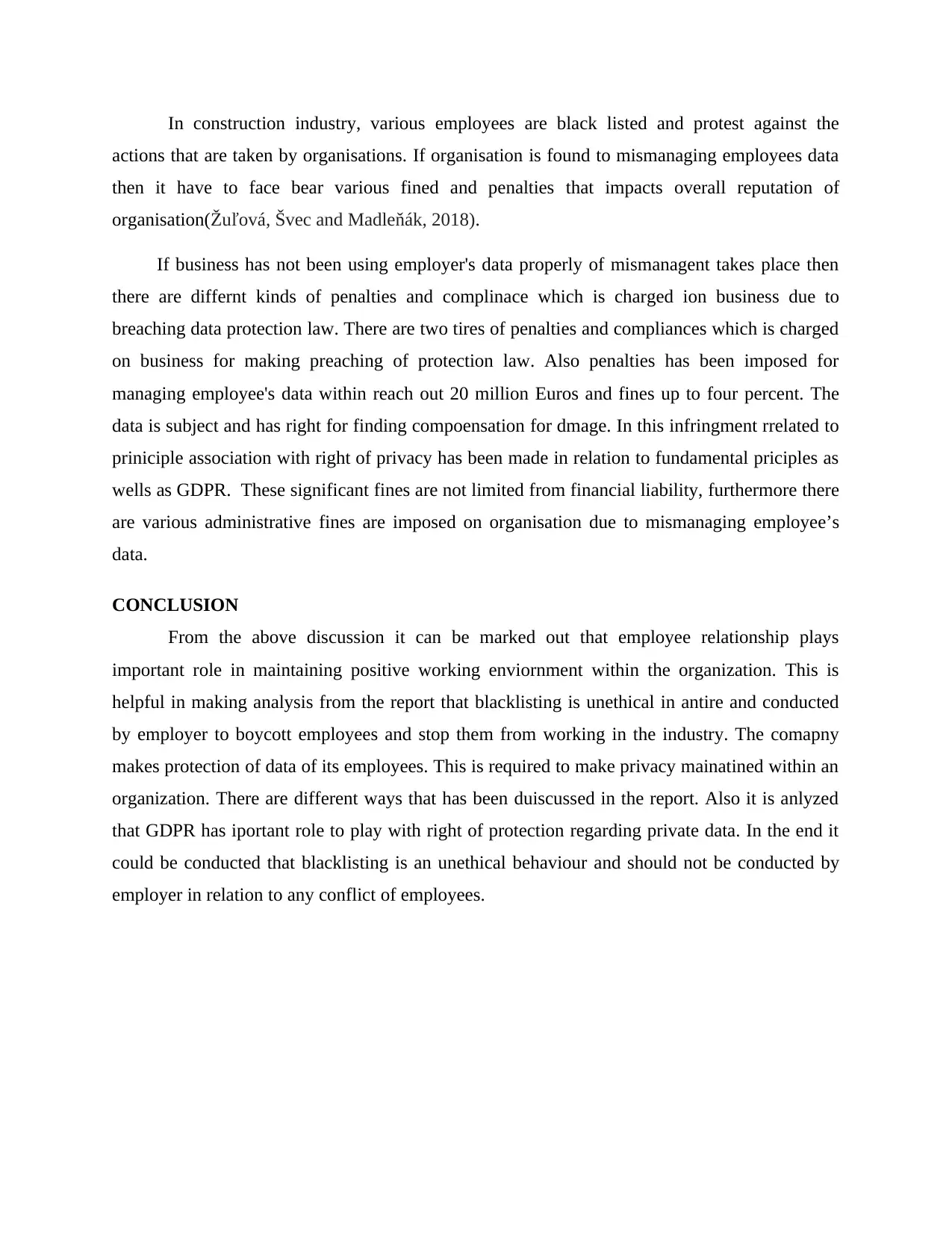
In construction industry, various employees are black listed and protest against the
actions that are taken by organisations. If organisation is found to mismanaging employees data
then it have to face bear various fined and penalties that impacts overall reputation of
organisation(Žuľová, Švec and Madleňák, 2018).
If business has not been using employer's data properly of mismanagent takes place then
there are differnt kinds of penalties and complinace which is charged ion business due to
breaching data protection law. There are two tires of penalties and compliances which is charged
on business for making preaching of protection law. Also penalties has been imposed for
managing employee's data within reach out 20 million Euros and fines up to four percent. The
data is subject and has right for finding compoensation for dmage. In this infringment rrelated to
priniciple association with right of privacy has been made in relation to fundamental priciples as
wells as GDPR. These significant fines are not limited from financial liability, furthermore there
are various administrative fines are imposed on organisation due to mismanaging employee’s
data.
CONCLUSION
From the above discussion it can be marked out that employee relationship plays
important role in maintaining positive working enviornment within the organization. This is
helpful in making analysis from the report that blacklisting is unethical in antire and conducted
by employer to boycott employees and stop them from working in the industry. The comapny
makes protection of data of its employees. This is required to make privacy mainatined within an
organization. There are different ways that has been duiscussed in the report. Also it is anlyzed
that GDPR has iportant role to play with right of protection regarding private data. In the end it
could be conducted that blacklisting is an unethical behaviour and should not be conducted by
employer in relation to any conflict of employees.
actions that are taken by organisations. If organisation is found to mismanaging employees data
then it have to face bear various fined and penalties that impacts overall reputation of
organisation(Žuľová, Švec and Madleňák, 2018).
If business has not been using employer's data properly of mismanagent takes place then
there are differnt kinds of penalties and complinace which is charged ion business due to
breaching data protection law. There are two tires of penalties and compliances which is charged
on business for making preaching of protection law. Also penalties has been imposed for
managing employee's data within reach out 20 million Euros and fines up to four percent. The
data is subject and has right for finding compoensation for dmage. In this infringment rrelated to
priniciple association with right of privacy has been made in relation to fundamental priciples as
wells as GDPR. These significant fines are not limited from financial liability, furthermore there
are various administrative fines are imposed on organisation due to mismanaging employee’s
data.
CONCLUSION
From the above discussion it can be marked out that employee relationship plays
important role in maintaining positive working enviornment within the organization. This is
helpful in making analysis from the report that blacklisting is unethical in antire and conducted
by employer to boycott employees and stop them from working in the industry. The comapny
makes protection of data of its employees. This is required to make privacy mainatined within an
organization. There are different ways that has been duiscussed in the report. Also it is anlyzed
that GDPR has iportant role to play with right of protection regarding private data. In the end it
could be conducted that blacklisting is an unethical behaviour and should not be conducted by
employer in relation to any conflict of employees.
Paraphrase This Document
Need a fresh take? Get an instant paraphrase of this document with our AI Paraphraser
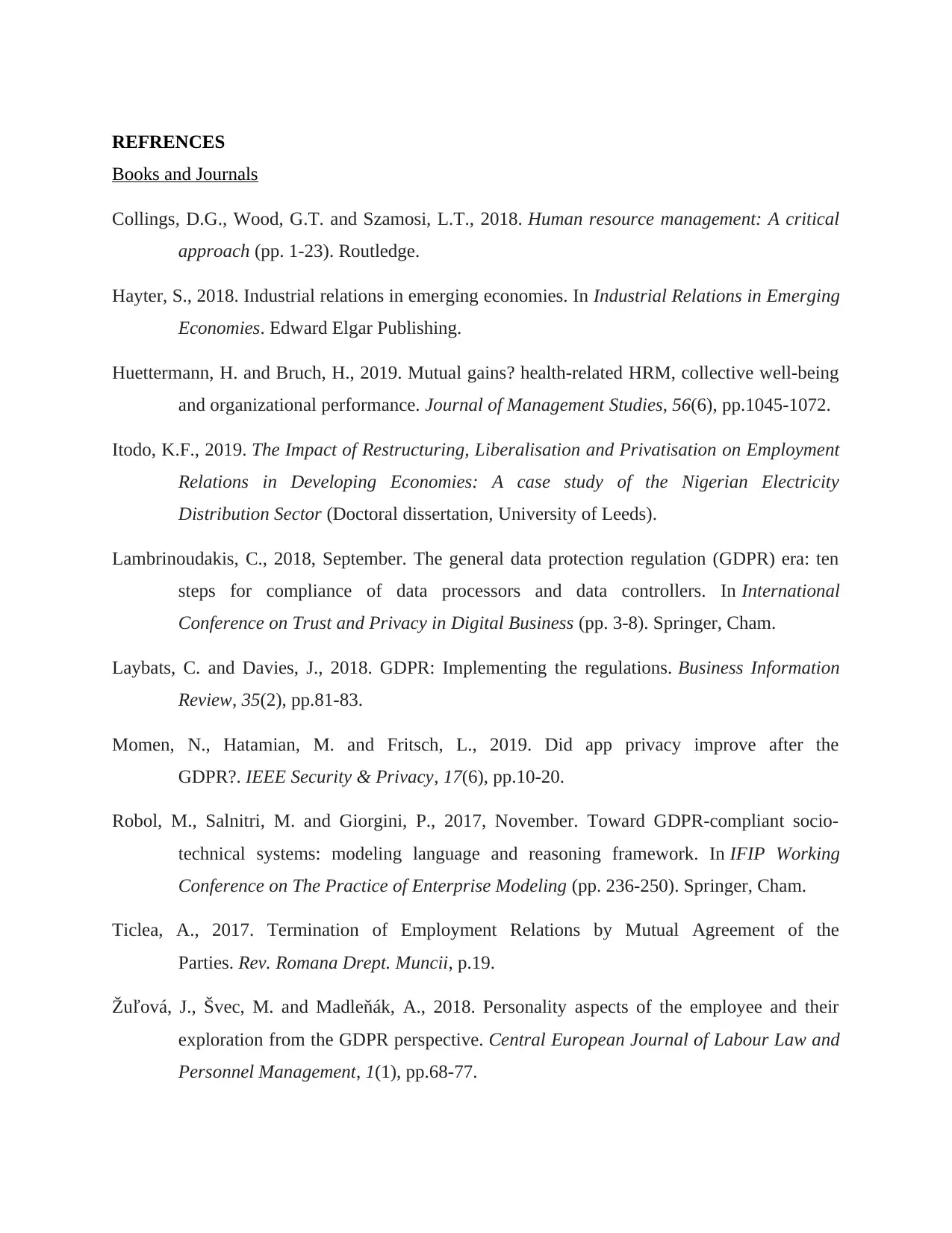
REFRENCES
Books and Journals
Collings, D.G., Wood, G.T. and Szamosi, L.T., 2018. Human resource management: A critical
approach (pp. 1-23). Routledge.
Hayter, S., 2018. Industrial relations in emerging economies. In Industrial Relations in Emerging
Economies. Edward Elgar Publishing.
Huettermann, H. and Bruch, H., 2019. Mutual gains? health‐related HRM, collective well‐being
and organizational performance. Journal of Management Studies, 56(6), pp.1045-1072.
Itodo, K.F., 2019. The Impact of Restructuring, Liberalisation and Privatisation on Employment
Relations in Developing Economies: A case study of the Nigerian Electricity
Distribution Sector (Doctoral dissertation, University of Leeds).
Lambrinoudakis, C., 2018, September. The general data protection regulation (GDPR) era: ten
steps for compliance of data processors and data controllers. In International
Conference on Trust and Privacy in Digital Business (pp. 3-8). Springer, Cham.
Laybats, C. and Davies, J., 2018. GDPR: Implementing the regulations. Business Information
Review, 35(2), pp.81-83.
Momen, N., Hatamian, M. and Fritsch, L., 2019. Did app privacy improve after the
GDPR?. IEEE Security & Privacy, 17(6), pp.10-20.
Robol, M., Salnitri, M. and Giorgini, P., 2017, November. Toward GDPR-compliant socio-
technical systems: modeling language and reasoning framework. In IFIP Working
Conference on The Practice of Enterprise Modeling (pp. 236-250). Springer, Cham.
Ticlea, A., 2017. Termination of Employment Relations by Mutual Agreement of the
Parties. Rev. Romana Drept. Muncii, p.19.
Žuľová, J., Švec, M. and Madleňák, A., 2018. Personality aspects of the employee and their
exploration from the GDPR perspective. Central European Journal of Labour Law and
Personnel Management, 1(1), pp.68-77.
Books and Journals
Collings, D.G., Wood, G.T. and Szamosi, L.T., 2018. Human resource management: A critical
approach (pp. 1-23). Routledge.
Hayter, S., 2018. Industrial relations in emerging economies. In Industrial Relations in Emerging
Economies. Edward Elgar Publishing.
Huettermann, H. and Bruch, H., 2019. Mutual gains? health‐related HRM, collective well‐being
and organizational performance. Journal of Management Studies, 56(6), pp.1045-1072.
Itodo, K.F., 2019. The Impact of Restructuring, Liberalisation and Privatisation on Employment
Relations in Developing Economies: A case study of the Nigerian Electricity
Distribution Sector (Doctoral dissertation, University of Leeds).
Lambrinoudakis, C., 2018, September. The general data protection regulation (GDPR) era: ten
steps for compliance of data processors and data controllers. In International
Conference on Trust and Privacy in Digital Business (pp. 3-8). Springer, Cham.
Laybats, C. and Davies, J., 2018. GDPR: Implementing the regulations. Business Information
Review, 35(2), pp.81-83.
Momen, N., Hatamian, M. and Fritsch, L., 2019. Did app privacy improve after the
GDPR?. IEEE Security & Privacy, 17(6), pp.10-20.
Robol, M., Salnitri, M. and Giorgini, P., 2017, November. Toward GDPR-compliant socio-
technical systems: modeling language and reasoning framework. In IFIP Working
Conference on The Practice of Enterprise Modeling (pp. 236-250). Springer, Cham.
Ticlea, A., 2017. Termination of Employment Relations by Mutual Agreement of the
Parties. Rev. Romana Drept. Muncii, p.19.
Žuľová, J., Švec, M. and Madleňák, A., 2018. Personality aspects of the employee and their
exploration from the GDPR perspective. Central European Journal of Labour Law and
Personnel Management, 1(1), pp.68-77.

⊘ This is a preview!⊘
Do you want full access?
Subscribe today to unlock all pages.

Trusted by 1+ million students worldwide
1 out of 9
Related Documents
Your All-in-One AI-Powered Toolkit for Academic Success.
+13062052269
info@desklib.com
Available 24*7 on WhatsApp / Email
![[object Object]](/_next/static/media/star-bottom.7253800d.svg)
Unlock your academic potential
Copyright © 2020–2026 A2Z Services. All Rights Reserved. Developed and managed by ZUCOL.




